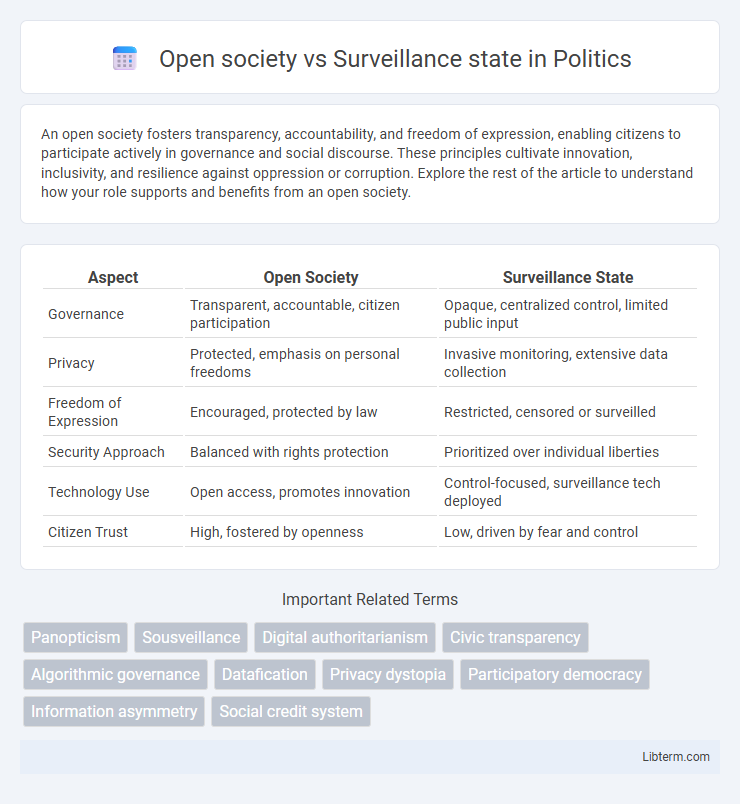An open society fosters transparency, accountability, and freedom of expression, enabling citizens to participate actively in governance and social discourse. These principles cultivate innovation, inclusivity, and resilience against oppression or corruption. Explore the rest of the article to understand how your role supports and benefits from an open society.
Table of Comparison
| Aspect | Open Society | Surveillance State |
|---|---|---|
| Governance | Transparent, accountable, citizen participation | Opaque, centralized control, limited public input |
| Privacy | Protected, emphasis on personal freedoms | Invasive monitoring, extensive data collection |
| Freedom of Expression | Encouraged, protected by law | Restricted, censored or surveilled |
| Security Approach | Balanced with rights protection | Prioritized over individual liberties |
| Technology Use | Open access, promotes innovation | Control-focused, surveillance tech deployed |
| Citizen Trust | High, fostered by openness | Low, driven by fear and control |
Defining Open Societies and Surveillance States
Open societies are characterized by transparent governance, protection of individual freedoms, and active citizen participation, fostering democratic values and human rights. Surveillance states prioritize extensive monitoring and data collection, often restricting privacy and civil liberties to maintain control and security. The fundamental difference lies in the balance between openness and security, where open societies emphasize trust and accountability, while surveillance states rely on oversight and control mechanisms.
Historical Background of Social Governance
The historical background of social governance reveals a complex evolution from open societies, characterized by transparency, civil liberties, and participatory decision-making, to surveillance states prioritizing security and control through extensive monitoring systems. Ancient democratic practices in Greece and the Enlightenment ideals laid the foundation for open societies valuing individual freedom and accountability, contrasting sharply with totalitarian regimes of the 20th century that employed mass surveillance to maintain power. Technological advancements in data collection and digital communication have further shifted governance paradigms, intensifying debates over privacy, state authority, and citizen rights in contemporary societies.
Core Principles of Open Societies
Open societies prioritize transparency, freedom of expression, and the protection of individual rights, fostering a democratic environment where diverse viewpoints can thrive. Core principles include accountability of government institutions, rule of law, and civic participation, ensuring power is checked and citizens remain informed and empowered. These elements collectively promote social trust and innovation, contrasting starkly with surveillance states that emphasize control and secrecy.
Mechanisms and Tools of Surveillance States
Surveillance states utilize pervasive mechanisms such as mass data collection, facial recognition technology, and internet monitoring to control and influence populations. Advanced tools including AI-driven analytics, biometric databases, and real-time signal interception enable governments to track individuals' activities and suppress dissent effectively. These systems often operate with limited transparency, creating a digital environment where privacy is compromised in favor of state security.
Privacy vs. Security: The Central Dilemma
Balancing privacy and security remains the central dilemma between open societies and surveillance states, where open societies prioritize individual freedoms and data protection, while surveillance states emphasize extensive monitoring to enhance collective security. The trade-off involves complex ethical and legal challenges, as excessive surveillance risks infringing on civil liberties and fostering distrust among citizens. Effective governance requires transparent policies and accountability to ensure security measures do not erode fundamental privacy rights.
Impact on Civil Liberties and Human Rights
An open society prioritizes transparency, freedom of expression, and protection of individual rights, fostering democratic participation and accountability. In contrast, a surveillance state often undermines civil liberties by imposing extensive monitoring, restricting privacy, and enabling government overreach. This shift threatens fundamental human rights such as freedom of speech, assembly, and protection from arbitrary detention, leading to increased social control and diminished public trust.
Technology’s Role in Both Models
Technology in an open society facilitates transparency, citizen empowerment, and privacy protection through encrypted communication, open data platforms, and decentralized networks. In contrast, a surveillance state leverages advanced technologies like mass data collection, facial recognition, and AI-driven monitoring systems to exert control, suppress dissent, and infringe on individual freedoms. The divergence lies in technology's deployment: enabling democratic participation versus enabling authoritarian oversight.
Societal Trust and Government Transparency
Open societies prioritize government transparency, fostering societal trust through open access to information and accountable institutions. Surveillance states often erode trust by limiting transparency and increasing suspicion among citizens regarding government activities. High levels of transparency correlate with stronger societal trust, while pervasive surveillance typically undermines civic confidence and social cohesion.
Global Examples and Case Studies
Open societies prioritize transparency, individual freedoms, and democratic governance, exemplified by countries like Sweden and Canada, where robust privacy laws protect citizens from invasive surveillance. In contrast, surveillance states such as China and Russia implement extensive monitoring systems, including facial recognition and internet censorship, to control public behavior and suppress dissent. Case studies reveal that while open societies benefit from trust and innovation, surveillance states often face international criticism for human rights violations and lack of accountability.
The Future: Striking a Balance
The future of governance hinges on balancing open society principles with the realities of a surveillance state, ensuring privacy rights are preserved while enhancing security measures. Implementing strong data protection laws and transparent oversight mechanisms supports citizen trust and democratic accountability. Innovations in privacy-preserving technologies, such as encryption and anonymization, enable surveillance without infringing on fundamental freedoms.
Open society Infographic

 libterm.com
libterm.com